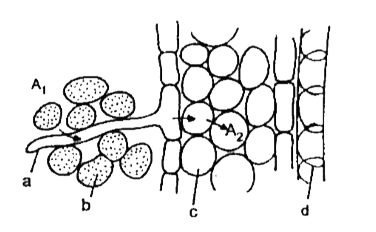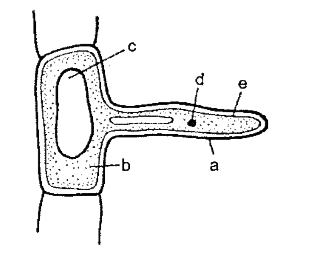Plant roots function to
anchor the plant
store the products of photosynthesis
produce hormones that stimulate sem growth
all of the above
The correct Answer is:D
Step-by-Step Solution:
1. Identify the Functions of Plant Roots:
- Plant roots serve multiple essential functions that contribute to the overall health and growth of the plant.
2. Anchorage:
- One of the primary functions of roots is to anchor the plant securely into the soil. This stability allows the plant to withstand environmental factors such as wind and rain.
3. Absorption:
- Roots are responsible for absorbing water and essential nutrients from the soil. This process is crucial for the plant's survival and growth.
4. Conduction:
- After absorption, roots conduct the absorbed water and nutrients up to the stem and leaves, where they are utilized for various physiological processes.
5. Storage:
- Roots also store the products of photosynthesis, such as carbohydrates. This stored energy can be used by the plant during periods when photosynthesis is not possible, such as at night or during winter.
6. Hormonal Production:
- The root tips produce hormones, such as auxin, which play a vital role in stimulating stem growth. Hormones produced in the roots can influence various growth processes in the plant.
7. Vegetative Reproduction:
- Roots can participate in vegetative reproduction, allowing new plants to grow from the roots of an existing plant.
8. Competition:
- Roots also engage in competition with other plants for water and nutrients in the soil.
9. Conclusion:
- Considering all the functions mentioned, we can conclude that plant roots perform multiple roles including anchoring the plant, storing products of photosynthesis, and producing hormones that stimulate growth. Therefore, the correct answer to the question "Plant roots function to" is all of the above.
- Plant roots serve multiple essential functions that contribute to the overall health and growth of the plant.
- One of the primary functions of roots is to anchor the plant securely into the soil. This stability allows the plant to withstand environmental factors such as wind and rain.
- Roots are responsible for absorbing water and essential nutrients from the soil. This process is crucial for the plant's survival and growth.
- After absorption, roots conduct the absorbed water and nutrients up to the stem and leaves, where they are utilized for various physiological processes.
- Roots also store the products of photosynthesis, such as carbohydrates. This stored energy can be used by the plant during periods when photosynthesis is not possible, such as at night or during winter.
- The root tips produce hormones, such as auxin, which play a vital role in stimulating stem growth. Hormones produced in the roots can influence various growth processes in the plant.
- Roots can participate in vegetative reproduction, allowing new plants to grow from the roots of an existing plant.
- Roots also engage in competition with other plants for water and nutrients in the soil.
- Considering all the functions mentioned, we can conclude that plant roots perform multiple roles including anchoring the plant, storing products of photosynthesis, and producing hormones that stimulate growth. Therefore, the correct answer to the question "Plant roots function to" is all of the above.
Topper's Solved these Questions
- BOOK - ICSECHAPTER - TRANSPORT IN PLANTS EXERCISE - TEST YOUR PROGRESS (Fill in the blanks with appropriate words )32videos
TRANSPORT IN PLANTS
- BOOK - ICSECHAPTER - TRANSPORT IN PLANTS EXERCISE - TEST YOUR PROGRESS (State whether the following statements are true or false)16videos
TRANSPORT IN PLANTS
- BOOK - ICSECHAPTER - TRANSPORT IN PLANTS EXERCISE - REVIEW QUESTIONS (Questions based on diagrams or set-up)30videos
TRANSPORT IN PLANTS
- BOOK - ICSECHAPTER - THE LIVING WORLD EXERCISE - Ncert Exercises (Differentiate Between )4videos
THE LIVING WORLD
Similar Questions
In root nodules of leguminous plants, the function of leg-hemoglobin during biological nitrogen fixation is
View SolutionThe figure given is a cross section of the root along with a root hair.-Study it and answer the questions given below:

What is the function of part 'd' in a plant?View SolutionWhat is the function of a root hair?
View Solutionwhat is the function of the leaves in plants.
View SolutionStudy this structure of a root hair and answer the following:

What is the function of root hair?View SolutionWhat is a symbiotic relationship of fungi with plant roots known as?
View SolutionWhat is the function of vessels in flowering plants?
View SolutionWhich of the following is not a function of water in plants?
View SolutionThe plant body of higher plants is well differentiated and well developed. Roots are the organs used for the purpose of absorption. What is the equivalent of roots in the less developed lower plants?
View SolutionThe plant body in higher plants is well differentiated and well developed. Roots are the organs used for the purpose of absorption. What is the equivalent of roots in the less developed lower plants?
View Solution

